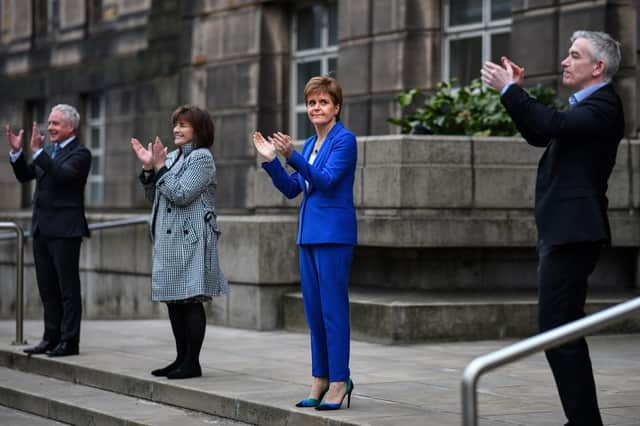Nicola Sturgeon, fresh from being praised by Iain Duncan Smith, takes a shot at Tory austerity – John McLellan


Everything is politics, said the German author Thomas Mann, whose most famous work Death in Venice was appropriately set against the background of an outbreak of cholera.
And even if his claim is a perfect example of philosopher Karl Popper’s theory of unfalsifiability, it has been put to the test by the Covid-19 outbreak where the public has been sold, and to a great extent bought, the idea that politics doesn’t matter, only what beats the virus.
Advertisement
Hide AdAdvertisement
Hide Ad“I have never been less interested in party politics than I am right now,” said First Minister Nicola Sturgeon on March 18, when the official death toll in Scotland stood at two. And as the number of Scottish fatalities approaches 2,000 this weekend, the overwhelming impression is that her view is unchanged.
Six weeks ago the political parties united behind her, but the strain began to show as opposition parties realised it serves no-one to suspend criticism and Labour was quickly out the blocks to challenge Conservative handling, only pausing briefly when it became clear the Prime Minister was seriously ill.
But while Labour went on the attack in London, Scottish Conservative leader Jackson Carlaw was reluctant to break the detente in Edinburgh because the country appeared united behind Ms Sturgeon’s leadership, but increasingly partisan attacks from those Nationalists who do not share the First Minister’s consensual approach made holding the line increasingly untenable. “Recorded deaths from Covid in England are double the rate of what they are in Scotland. Is it NHS Scotland’s vastly superior A&E performance?” tweeted Fife MP Douglas Chapman with staggering insensitivity as hundreds lay dead or dying in Scottish hospitals.
The First Minister has risen above low politics, creating a vacuum the likes of Mr Chapman have been only too eager to fill, but in effectively becoming a super-charged health minister it has put pressure on those around her and left the real Health Secretary Jeane Freeman looking increasingly irrelevant.
Of course the public expects her focus on the pandemic and lockdown to be total, and whether by accident or design the result has been the emergence of a “Mother of the Nation” figure who just two months ago was dividing not just the country but her own party. Only in the mishandling the Catherine Calderwood affair, by defending the Chief Medical Officer when the game was clearly up, has she looked unsteady and admitting to shedding tears about the crisis has only enhanced the perception of a woman with the steeliest of resolves but the warmest of hearts.
But has politics really been forgotten? The “Coronavirus: framework for decision making” document published this week clearly states “we can learn from others’ experience”, which sounds like good sense, but not exactly the bold leadership of growing myth. It could be argued that when everything is new, to let Westminster take the lead allows her team to learn from its mistakes and dodge the inevitable criticism.
The 26-page paper signalled a change; with new Labour leader Sir Kier Starmer demanding an exit strategy from the Conservatives, Ms Sturgeon seized the opportunity and produced one of her own. Again she took credit for straight-talking, saying a return to normal “is not on the cards in the near future” and grimly warning that large gatherings would be banned for some time. Even Sir Iain Duncan Smith and David Davis applauded her, but in the scramble to laud her honesty, it occurred to no-one that “seeking to start a grown-up conversation” begged the question about what other kind of conversation she considered.
And grown-up or otherwise, the new paper isn’t the Marshall Plan but a typical government rehash of information already available and openly discussed which just restates why relaxation is difficult. Pointing out “we will use the best available evidence and analysis” is hardly ground-breaking and if it was a Tory paper, it wouldn’t take barrister Sir Keir two minutes to throw it back across the Chamber.
Advertisement
Hide AdAdvertisement
Hide AdExtremist outriders who blame Boris Johnson for mass murder might be dismayed by repeated mention of “co-ordination and co-operation” with the UK Government, but one passage at the very end is telling: “The austerity-driven response to the 2008 financial crash did not work and worsened the inequality that was part of its cause; we must not repeat those mistakes,” it says.
With UK debt likely to be well over 100 per cent of GDP, it remains to be seen how the Scottish Government deals with the loss of a third of the economy, including 3.5 per cent from the Edinburgh economy through lost international tourism alone, but Ms Sturgeon has clearly not forgotten “Tory austerity” is still her real enemy.
So maybe it does indeed signal a return to normality. As Mann said, everything is politics.
The importance of good journalism
Congratulations to the Mail on Sunday at being Crowned Newspaper of the Year for 2019 in the Scottish Press Awards.
Its series on the fatal flaws at the Queen Elizabeth University Hospital is one of the few which still resonates in the Lockdown era; as a result of the problems it exposed, Glasgow NHS was put in special measures and the new Sick Kids Hospital in Edinburgh still lies empty when the NHS is crying out for resources.
The Lennox Herald’s “Lonely this Christmas” series won the local campaign award for its bid to help over 3,000 older people in the area and both show why sustainable, independent journalism must be part of the new normality.
Clarity over funerals needed
Writing about politics does represent something of a return to normality for me, and on Tuesday the last act of a difficult few weeks takes place at Glasgow’s Linn Crematorium when we say a final farewell to my father.
He would have been 87 on Monday, a good innings as they say, and at that age with a small family the lockdown restrictions don’t make that much of a difference. No need to cancel the gun carriage and the band of the Coldstream Guards.
Advertisement
Hide AdAdvertisement
Hide AdBut the rules are confusing; Glasgow Council says a maximum of 20 people and only close relatives, but the funeral director says a maximum of ten and anyone can go. Edinburgh council’s guidance says immediate family only but doesn’t put a number on it. So much for national clarity.
Avowedly atheist, he didn’t want a minister and I was offered a humanist celebrant, but with so few people there, like many in the same situation I don’t see the point of writing out some details for a stranger to read back to me and my family and pay them for the privilege.
So I’m doing it myself and my dad would have admired the parsimony. As he might have said, all you need is someone to press the ignition.
Comments
Want to join the conversation? Please or to comment on this article.
